Break Free 2018 - Here's What Happened!
On Friday, people across Africa stepped up their commitment to keeping fossil fuels in the ground with courageous actions that have challenged business as usual across Africa.
Click here to see photos from Break Free actions that happened on Friday!
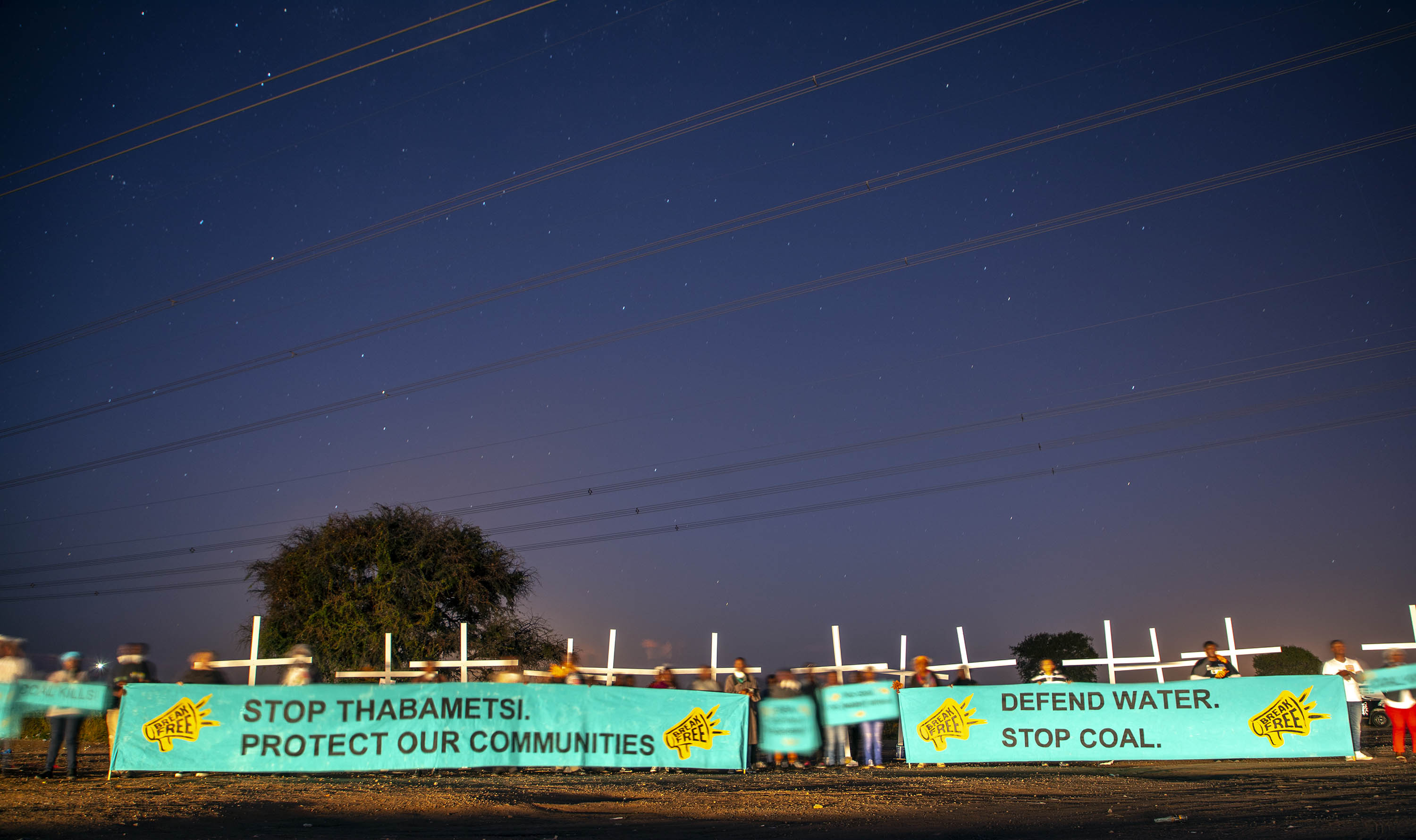
Break Free stood up to the proposed coal-fired station in Lamu, Kenya - told the Development Bank of Southern Africa to not fund Thabametsi, or any more coal projects in South Africa - reached out to communities in the Eastern region of Ghana (Dome, Asayansu, Kwesi Kunde, Fori) to promote and distribute renewable energy solutions.
#Breakfree Press Conference in Abuja Made Headlines, See one below:
We will not rest untill we #BreakFree from Fossil Fuels and embrace Renewable Energy for the good of all of us. @350Africa @AfricaCRP @ninteretse @GlenTyler @groundWorkSA @Rukiya_Khamis https://t.co/LprVpyiwgb— David Mike Terungwa (@miketerungwa) May 27, 2018
With powerful actions involving people across the continent, Break Free from Fossil Fuels took the fight directly to the fossil fuel industry and showed just how powerful we can be when we act together.
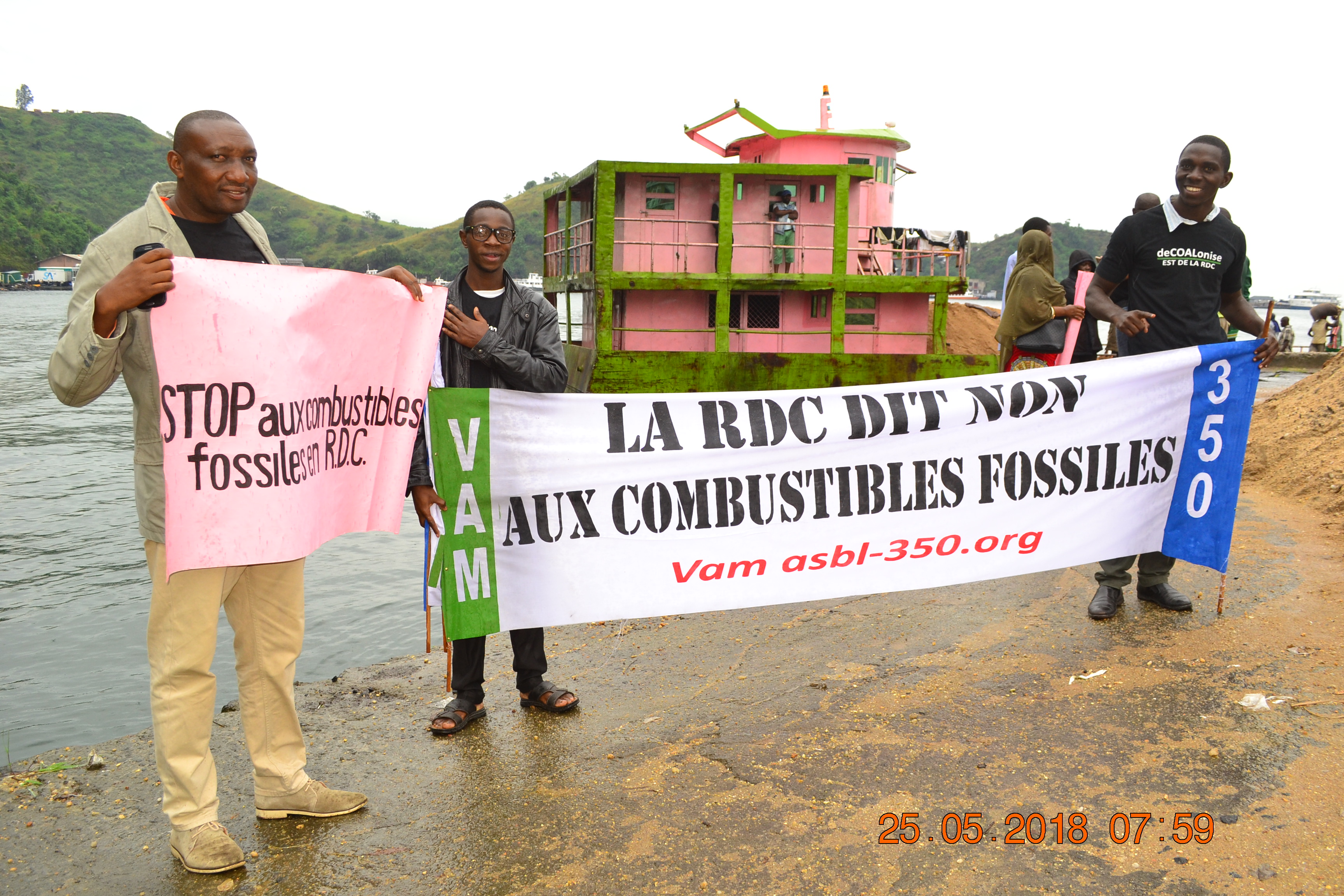
The only way we’ll defeat the fossil fuel industry, which is wrecking our climate is if we all come together to show it up for what it is: an immoral and dangerous industry that is at odds with a safe future.
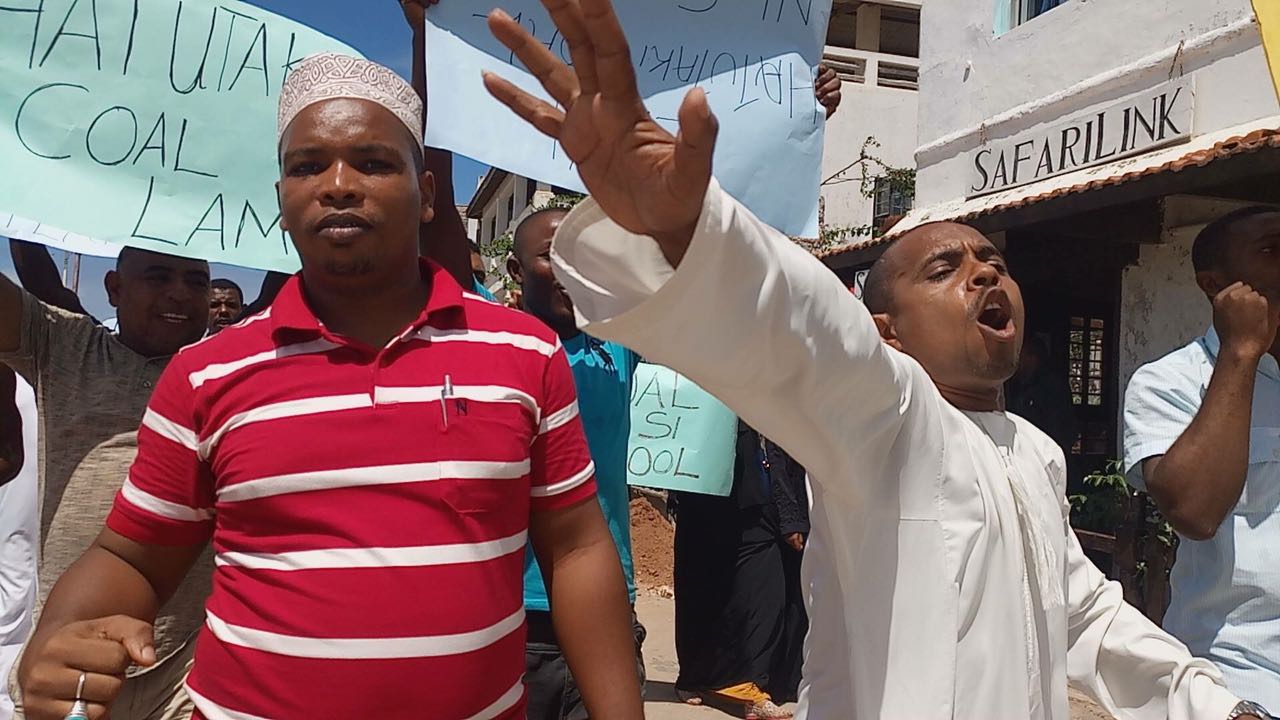
As the planet becomes dangerously hot, our greatest collective hope is that this movement continues to grow in size, strength and boldness. Friday showed what we can accomplish together.
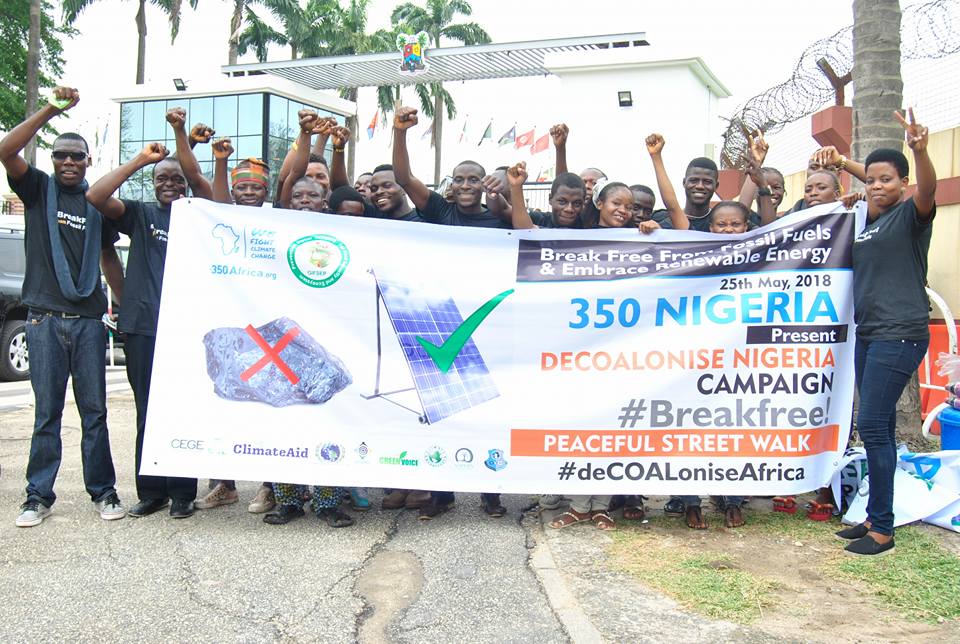
In every country that took action on Friday -- Cote D’Ivoire, South Africa, Nigeria, Egypt, Zambia, Senegal, Kenya, Togo, Uganda, Ghana -- organising against fossil fuels and for renewable energy will continue, stronger than ever.
Children are the future of tomorrow, let us habit train them to #breakfree and go for #fossilfree. Children in Kenya are saying #CoalSiCool @350_kenya @350Africa @ninteretse @deCOALonize @LamuYouthAllia1 @savelamu #deCOALonize pic.twitter.com/OjlAb902pj
— BintiKhamis (@Rukiya_Khamis) May 25, 2018
Because people everywhere see the writing on the wall: the planet is heating up, renewable energy is becoming more affordable, and the fossil fuel industry is entering a financial crisis, the time has come to stand up to its power and pollution.
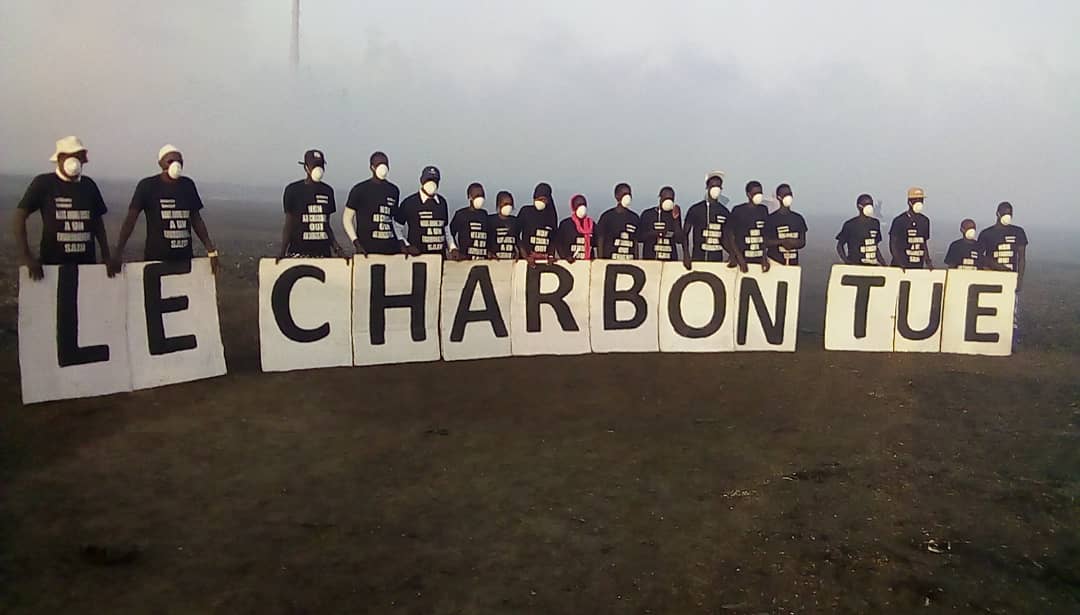
This movement will continue to grow in all of its forms: divesting from fossil fuels, blocking fossil fuel extraction and transportation, passing fracking bans, stopping new coal plants, ending fossil fuel subsidies, and securing commitments build a 100% renewable economy.
in case you missed us ,#GreenEnergy is the future.#breakfree #fossilfuel #FossilFriday #fossilfree #ClimateChange pic.twitter.com/9pw4wjvn9k
— Asmaa Hanafi (@AsmaaHanafi1) May 27, 2018
But our work does not end here. The need for a rapid transition to renewable energy has never been more urgent, and the way we get there is by continuing to organise, mobilise and campaign.
This how we did it in Lagos Nigeria. Happy that African Youths are Championing this course- We must #BreakFree from Dirty Energy. @350Africa @AfricaCRP @gifsep4climate @ninteretse @GlenTyler @Rukiya_Khamis pic.twitter.com/BJJVFp9bch
— David Mike Terungwa (@miketerungwa) May 26, 2018
Even though Break Free 2018 is now over, you can get involved in climate campaigns and mobilisations by signing up to the deCOALonise.africa platform mailing list, or getting involved in the global mobilisation, Rise for Climate.
Break Free 2018: These events caught our imagination.
-
In Kenya - Folks will be rolling out coordinated actions - Photo exhibitions, debates, twitter chats, and an “AntiCoal Khanga show“ in Lamu challenging women to use a traditional attire (Khanga: a vibrantly coloured East African cloth worn by women) to tell the African story of fossil fuel impacts.
-
In Nigeria - People will be joining forces to talk about the easy switch from generators and kerosene for lighting to solar in a caravan around a college. A press conference with people from mining-affected communities, a renewable energy presentation and non-violent direct action training will also be held.
-
In Ivory coast - Film screenings and community debate to denounce a coal plant project in San-Pedro, alongside a Twitter chat addressed to the AfDB - who are funding coal projects across Africa to reiterate that Ivory Coast doesn’t need coal, but rather renewables to satisfy its energy demand and accelerate its development.
-
In South Africa, events range from rallies to workshops on climate change and the case for breaking free from fossil fuels, to people calling on the Development Bank of Southern Africa to publicly commit to not funding the Thabametsi coal-fired power plant.
-
In Senegal - Civil society and climate justice groups, local communities, students and women groups are attending a large community forum in Bargny to oppose the launch of the first coal power plant in Senegal and call on the government to stop this project.
-
In Ghana - 350 GROC is reaching out to communities in the Eastern region of Ghana (Dome, Asayansu, Kwesi Kunde, Fori) to mobilise on renewable energy This event is part of the ongoing campaign led by GROC to advocate for a rapid transition towards 100% renewables as a way of increasing electricity access to communities.
Why we’re Breaking Free from fossil fuels on the 25th of May
We’re gearing up in South Africa and together with groups from all over the continent to #BreakFree from fossil fuels on the 25th of May - Africa Day. With groups hosting events in many different countries, we hope it will be a day where we demonstrate that African people do not want fossil fuels.
This is why we think this work is so important:
- Fossil fuels are killing us. Burning of coal for electricity causes terrible air pollution which has been shown to be responsible for illness and deaths among those affected.

- Climate change is impacting our continent hardest, displacing people and destroying livelihoods.
 Image © AlJazeera
Image © AlJazeera - We believe a more equitable energy future is possible. Renewable energy has the potential to put the power of generation in many people's hands, not only a few.

- We need a united voice. There are many African people and groups working to end the age of fossil fuels in Africa, if we all come together at the same time though, our voices are more powerful. deCOALonise.africa was started in order to do this.

What are your reasons for getting involved? We’d love to hear them.
You can help us by joining an event near you, or hosting your own event. Can you believe that our very own African Development Bank is financing coal-fired power plants all over Africa? Join us in showing them that we want to deCOALonise our continent!
Africa uniting forces to challenge the fossil industry on May 25
Coal plant bi dou fi takke. This is the slogan hammered by the community in Bargny, a village located 30 km south from Dakar that the 350 Africa team recently met on the site where Senegal’s first coal plant has just been built.
Coal plant bi dou fi takke means 'the coal-fired power plant will not get launched here'. The completion of the plant did not affect the determination of the Bargny and Sendou communities who continue to oppose this project.
In Senegal as in Ivory Coast, Kenya, Nigeria and Mozambique where governments seem to be fond of coal-fired power stations, we are hearing and seeing this same strong feeling of resistance and opposition from communities, local groups, and civil society in general. Collectively, they denounce the so-called energy projects with disastrous social, health and environmental impacts.
Conscious of this fierce opposition from communities against the proliferation of coal-fired power plants on the continent, 350 Africa in collaboration with these same communities and regional partners is organising a Regional Day of Action called "Break Free from Fossil Fuels" on May 25.
On that day, communities, civil society groups and other activists will organise various mobilisation actions - from street walks to the community forums, field visits to affected sites, exhibitions and press conferences - all of them united by the same message : No to fossil fuels in Africa, targeting the existing and proposed fossil fuel projects on the continent.
Now more than ever, the time has come for Africa and its people to reject this type of obsolete energy, which is being phased out across the world. It is unanimously recognised for its major contribution to the ongoing climate crisis. Being the most vulnerable continent to climate impacts, it is inconceivable to consider a polluting, destructive and obsolete energy model in the name of development in Africa.
No, Africa does not need fossil fuels to meet its growing demand for energy. Africa has a wide range of renewable resources that can be used to boost its economy. This is the message that African activists are going to convey to their local and national leaders, as well as to international institutions like the African Development Bank that continues to fund coal projects on the continent.
The registration of events for Break Free from Fossil Fuels 2018 has already started and is still going on. We encourage you to register yours as soon as possible. It doesn’t matter at this stage if you don’t have a clear idea or plan in place - register your action and we’ll help you with the rest. We’ll encourage and help you plan powerful, public actions that pull the mask of respectability off the fossil fuel industry.
